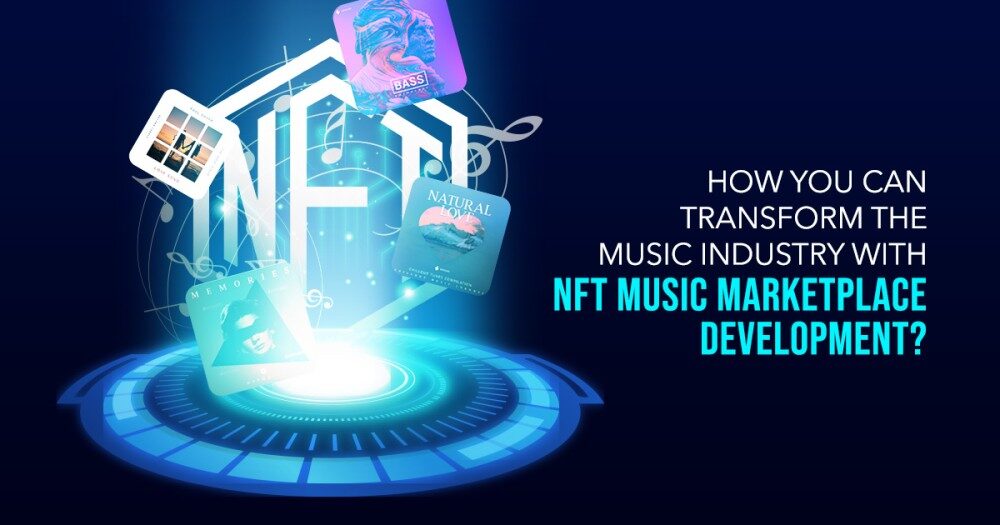How can one create their own Music NFT?
The music industry has undergone numerous changes over the years. The art of listening to music has taken many forms, ranging from tapes, records, compact cassettes, track tapes, and compact discs in the twentieth century to downloadable streaming apps/platforms in the early 2000s. The music industry is now reliant on DSPs (Downloadable streaming platforms), and despite the convenient access and low-cost perks for listeners or users, artists do not make as much. Most musicians are still struggling as they still do not make enough money from their music, with tours, merchandise sales, and partnerships bringing in the most money. It raises the question of whether we’re due for any other upgrade in the field of music. Affirmatively, that is where the NFTs marketplace development comes in.
Kudos to the NFT music marketplace; musicians can sell their royalty rights to the buyers or stakeholders and gain more profits before their single track is out. While record labels and streaming sites pay hardly anything, one NFT worth 50 percent of royalties on a solo track might make beyond what these musicians seemed to make, yet they still need to hold the other 50 percent of the royalties. This profitable initiative left the doors wide open for plenty of talented musicians who made hundreds of millions of dollars.
How can musicians develop NFT?
One option is to approach an NFT marketplace development company, which enables you to develop music NFTs without any programming experience. Creating your original NFTs for music is an excellent method to expand your brand and monetize your work. You may strengthen your connections and relationships with your audience by providing them with exclusive access to your songs.
How does the NFT music marketplace work?
NFTs are unique and new digital assets stored and traded on a blockchain. They are unchangeable, scarce, and publicly provable. Artists can sell restricted digital content to fans who pay using cryptocurrency in the music industry. You can now create any streaming music that you cannot copy.
What is its goal of it?
While there are no fixed frameworks for the collaboration, there are a few ways great artists have been using NFTs that upcoming artists might learn. These are some examples:
Album debuts
In February, the popular American musician 3LAU sold his tokenized album for more than $11 million. Although this selling amount may be an exception, other artists can learn from it. Limited editions of your record can be auctioned on-chain, imaginatively offering exclusive content. Furthermore, every subsequent sale of the NFTs earns the artists a commission.
Merch sales
Merch, both virtual and physical, can be added to the chain. And they are available for trading by anyone. And as usual, artists receive a percentage of any secondary sales.
Beat selling
Producers can now offer straight music NFTs straight to buyers by selling beats. Because of the irreversibility of NFTs, the users can buy these beats on-chain and use them immediately or keep them for profit on resales. Every resale profits the music producer a royalty.
Stock-type distribution layout
Although unproven, this is another method NFTs can help the music industry. Think about selling 20% of the rights to your future record as NFTs. Signifies that, in addition to on-chain money, fans who own NFTs will receive a percentage of off-chain revenue generated by your music, such as streaming, TV collaborations, and retail sales. Consider it a tokenized stock certificate that gives ownership of the record. In this manner, you may create a system around your work that benefits both you and your committed followers. Furthermore, holders get access to exclusive features such as front-row seating, special concerts, listening parties, etc.
What do you need to know before you start minting the first NFT?
You can be the originator or be minted from collections, but a gas price is required even at zero point to creation. And if you make your original music, you will still have to pay to have it converted into NFT format. It does not have to be sold; you can keep it in your wallet, but you’ll still have to pay a gas fee for the creation. And if you’re an investor, you should be aware that there are various types of musical NFT forms.
One shares the song’s royalties with you, allowing you to earn a return on your investment, while the other sells the copyright to pretend you own it but retains the revenues. So take the time to learn what kind of NFT you’re getting, and don’t be upset if you don’t see any royalty money.
Final Words: Future of Music NFTs
For starters, we may see more artists use NFTs to thank their followers. It would strengthen the bond between artists and audiences and encourage fan engagement. Secondly, new NFT marketing services that allow you to develop and sell NFTs without programming skills could emerge. These new services would facilitate people’s involvement in NFTs and music.
Overall, artists are beginning to see the benefits of integrating music and NFTs. Entrepreneurs seize this moment by launching an NFT music marketplace. As artists aspire for success in their careers, NFTs are becoming a unique way to leverage the promise of this developing blockchain technology.
